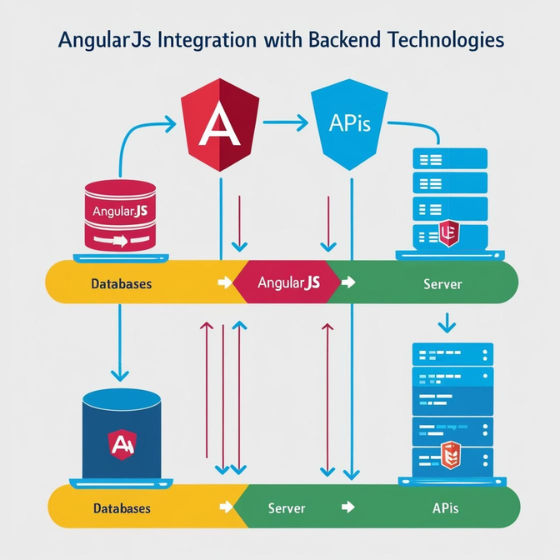How to Optimize Angular.js Applications for Performance
Introduction
Did you know that a one-second delay in website load time can decrease customer satisfaction by up to 16%? Performance optimization is not just a technical necessity but a business imperative. For Angular.js applications, achieving optimal performance can ensure higher user engagement, better conversion rates, and an overall competitive edge.
In this blog, we’ll explore how to optimize Angular.js applications for performance. Whether you’re a developer or a decision-maker, these actionable insights will help you create fast, efficient, and responsive applications that keep users coming back.
Why Performance Optimization Matters in Angular.js
Angular.js is a powerful framework for building dynamic and feature-rich applications. However, as applications grow in complexity, performance challenges can arise, including slow rendering, laggy interfaces, and high memory usage.
Optimizing performance ensures:
- Faster load times, improving user retention.
- Enhanced user experience, leading to better reviews and recommendations.
- Reduced operational costs by minimizing server load and resource usage.
Let’s dive into proven strategies to make your Angular.js application run at peak performance.
1. Adopt Best Coding Practices
Efficient coding lays the foundation for performance optimization. Small improvements in code structure can lead to significant performance gains.
Key tips:
- Reduce watchers: Limit the number of data bindings to minimize processing overhead.
- Simplify DOM structure: A cleaner and less complex DOM enhances rendering speed.
- Avoid redundant processes: Ensure there are no unnecessary computations during data updates.
Following these principles not only boosts performance but also makes the application easier to maintain.
2. Leverage Lazy Loading
Lazy loading is a game-changer for Angular.js applications with multiple modules. By loading components only when needed, you can significantly improve the initial load time of your app.
Benefits of Lazy Loading:
- Faster initial load for users.
- Reduced bandwidth consumption.
- Better user experience as heavy components are deferred until necessary.
Implementing lazy loading ensures your application feels lighter and more responsive, keeping users engaged.
3. Optimize the Digest Cycle
The digest cycle is the core of Angular.js’s two-way data binding, but inefficient management can slow down your app.
Ways to streamline the digest cycle:
- Minimize the number of bindings and watchers.
- Avoid using deeply nested objects for data bindings.
- Use
$applyAsyncto batch updates and reduce the number of cycles.
An optimized digest cycle ensures smoother user interactions and faster updates within your application.
4. Implement Caching Mechanisms
Caching is an effective way to reduce server calls and enhance data retrieval times. Angular.js supports several caching techniques to make applications faster.
Benefits of caching:
- Improved data retrieval speed.
- Reduced server load and latency.
- Enhanced user experience with quicker response times.
Using caching thoughtfully ensures that repetitive processes are handled efficiently, freeing up resources for critical tasks.
5. Optimize Media and Assets
Large media files often account for slow-loading applications. Optimizing these assets can drastically improve performance.
Tips for media optimization:
- Compress images using tools like TinyPNG.
- Use modern file formats like WebP for better compression without loss of quality.
- Implement lazy loading for images, ensuring they load only when visible to the user.
These techniques enhance load times and reduce unnecessary strain on user devices and servers.
6. Reduce Application Bundle Size
A leaner application loads faster, providing a seamless experience. Reducing the bundle size ensures your app doesn’t overwhelm users with unnecessary data.
Strategies to reduce bundle size:
- Eliminate unused libraries and code dependencies.
- Compress JavaScript and CSS files for quicker downloads.
- Use tree shaking to remove dead or redundant code.
A smaller application footprint translates to faster loads and better accessibility across various devices.
7. Use Server-Side Rendering (SSR)
Server-side rendering is a powerful optimization strategy for Angular.js applications. By pre-rendering pages on the server, you can deliver fully-formed pages to users quickly.
Why choose SSR?
- Faster initial load times for users.
- Improved SEO, as search engines can easily crawl content.
- Better performance on low-powered devices.
SSR can make your application feel faster and more responsive, especially for users with slower connections.
8. Monitor and Test Performance
Regularly monitoring your application ensures that performance bottlenecks are identified and addressed promptly.
Recommended tools:
- Lighthouse: Provides insights into speed, SEO, and best practices.
- Angular Batarang: Specifically designed for debugging Angular.js applications.
- Performance dashboards: Use custom analytics to monitor real-time app performance.
Testing and monitoring are continuous processes that keep your application running at its best.
9. Partner with Experts for Optimization
While these strategies are effective, implementing them requires expertise and careful planning. Sodio’s team of Angular.js experts specializes in performance optimization, ensuring your applications are efficient, user-friendly, and scalable.
Why choose Sodio?
- Proven expertise in Angular.js application development.
- Tailored solutions to meet your specific business needs.
- End-to-end support for coding, optimization, and testing.
Explore our Custom App Development Services to see how we can elevate your Angular.js application.
Conclusion
Optimizing Angular.js applications for performance is not just about faster load times—it’s about delivering exceptional user experiences, reducing operational costs, and achieving your business goals. From lazy loading and caching to server-side rendering, each optimization step plays a crucial role in enhancing your application.
At Sodio, we understand the importance of creating fast and reliable Angular.js applications. Whether you’re looking to optimize an existing app or build a new one from scratch, we’re here to help.
Contact us today to learn more about our Angular.js Development Services and start your optimization journey!







